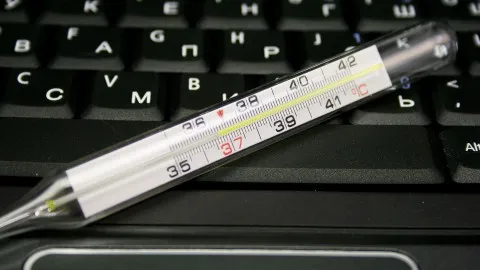
Free Physics Tutorial - IGCSE Physics Chapter 2 Thermal Physics (Cambridge CIE) 
This course will provide an in-depth overview of Thermal Physics, as outlined in the IGCSE Physics Chapter 2. You will learn about the transfer of energy, temperature, thermal expansion, and the laws of thermodynamics. You will also gain an understanding of the different types of energy transfer and how to calculate the heat capacity of a system. By the end of this course, you will be able to answer every question in the prior papers relating to thermal physics. ▼
ADVERTISEMENT
Course Feature
![]() Cost:
Cost:
Free
![]() Provider:
Provider:
Udemy
![]() Certificate:
Certificate:
No Information
![]() Language:
Language:
English
![]() Start Date:
Start Date:
Self Paced
Course Overview
❗The content presented here is sourced directly from Udemy platform. For comprehensive course details, including enrollment information, simply click on the 'Go to class' link on our website.
Updated in [May 25th, 2023]
This course provides an overview of IGCSE Physics Chapter 2 Thermal Physics (Cambridge CIE). It is designed to help students understand the concepts of thermal physics and answer questions from prior papers relating to the topic. The course covers topics such as heat transfer, thermal expansion, and the laws of thermodynamics. It also provides an introduction to the use of thermometers and calorimeters. By the end of the course, students will have a comprehensive understanding of thermal physics and be able to answer any questions from prior papers relating to the topic.
[Applications]
The application of this course can be seen in various areas. Students can use the knowledge gained from this course to better understand the concepts of thermal physics and apply them to their studies. They can also use the knowledge to answer questions related to thermal physics in exams. Additionally, the course can be used to gain a better understanding of the laws of thermodynamics and how they can be applied in everyday life. Finally, the course can be used to gain a better understanding of the different types of energy and how they can be used in various applications.
[Career Paths]
1. Thermodynamics
2. Heat Transfer
3. Kinetic Theory
1. Thermal Engineer: Thermal engineers are responsible for designing, developing, and testing thermal systems and components. They use their knowledge of thermodynamics, heat transfer, and fluid mechanics to create efficient and cost-effective solutions for a variety of industries. As the demand for energy efficiency increases, the need for thermal engineers is expected to grow.
2. Energy Analyst: Energy analysts are responsible for researching and analyzing energy usage and costs. They use their knowledge of thermodynamics, heat transfer, and fluid mechanics to identify areas of energy waste and develop strategies to reduce energy consumption. As the demand for renewable energy sources increases, the need for energy analysts is expected to grow.
3. HVAC Technician: HVAC technicians are responsible for installing, maintaining, and repairing heating, ventilation, and air conditioning systems. They use their knowledge of thermodynamics, heat transfer, and fluid mechanics to ensure that these systems are operating efficiently and safely. As the demand for energy efficiency increases, the need for HVAC technicians is expected to grow.
4. Refrigeration Technician: Refrigeration technicians are responsible for installing, maintaining, and repairing refrigeration systems. They use their knowledge of thermodynamics, heat transfer, and fluid mechanics to ensure that these systems are operating efficiently and safely. As the demand for energy efficiency increases, the need for refrigeration technicians is expected to grow.
[Education Paths]
1. Physics Degree: A physics degree is a great choice for those interested in exploring the fundamental laws of nature. This degree provides a strong foundation in mathematics, physics, and engineering, and can lead to a variety of career paths. With the development of new technologies, the demand for physicists is increasing, making this an attractive option for those looking to pursue a career in the sciences.
2. Engineering Degree: An engineering degree is a great choice for those interested in applying their knowledge of physics to the development of new technologies. This degree provides a strong foundation in mathematics, physics, and engineering, and can lead to a variety of career paths. With the development of new technologies, the demand for engineers is increasing, making this an attractive option for those looking to pursue a career in the sciences.
3. Computer Science Degree: A computer science degree is a great choice for those interested in exploring the application of physics to the development of new technologies. This degree provides a strong foundation in mathematics, physics, and computer science, and can lead to a variety of career paths. With the development of new technologies, the demand for computer scientists is increasing, making this an attractive option for those looking to pursue a career in the sciences.
4. Applied Physics Degree: An applied physics degree is a great choice for those interested in exploring the application of physics to the development of new technologies. This degree provides a strong foundation in mathematics, physics, and engineering, and can lead to a variety of career paths. With the development of new technologies, the demand for applied physicists is increasing, making this an attractive option for those looking to pursue a career in the sciences.
Pros & Cons

Good refresher from school

Explains concepts well

Lots of examples

Includes text for accent

Exercises and past papers

Amazing videos

Simple and concise explanation

Easy to understand

Very well modulated

Helpful for IGCSE exam

Talking too fast

Accent difficult to comprehend
Course Provider

Provider Udemy's Stats at AZClass
Discussion and Reviews
0.0 (Based on 0 reviews)
Explore Similar Online Courses

DP-100 Part 2 - Modeling

HI-FIVE: Health Informatics For Innovation Value & Enrichment (Clinical Perspective)

Python for Informatics: Exploring Information

Social Network Analysis

Introduction to Systematic Review and Meta-Analysis

The Analytics Edge

DCO042 - Python For Informatics

Causal Diagrams: Draw Your Assumptions Before Your Conclusions

Whole genome sequencing of bacterial genomes - tools and applications

Matrices for physics

AP Physics C - Electricity & Magnetism: Exam Prep


Start your review of Free Physics Tutorial - IGCSE Physics Chapter 2 Thermal Physics (Cambridge CIE)